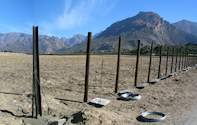What is Soil Preparation?
Soil preparation is the cultivation of the soil before the vineyard is established. It should not be confused with soil management which is the maintaining of the soil properties after the vineyard has been established. A thorough soil analysis by a consultant can indicate how uniform the area in question is, and if drastic differences occur, the layout should be adapted.

This could even mean that instead of a large block, two smaller blocks of vineyard should be planted to match the soil quality. One of the most important objectives of soil preparation is to get the soil as even as possible to ensure that the vines is even in terms of quality and ripening.
Soil inspections and analyzes by the soil scientist are very important, because the correct method of soil preparation can be recommended. Care should be taken to not bring brackish or clay soils to the surface, although at the same time as much as possible of the roots of the previous vines should be removed.
During soil preparation, the soil’s chemical defects and deficiencies must also be rectified. The soil expert will use the soil analysis to make recommendations on the chemical rectification of the soil.
Where brackish salts are found in the soil, it must be corrected during preparation with gypsum and drainage. Gypsum is a substance added to soil to increase calcium saturation. Acidic soil can be corrected by adding lime during soil preparation to neutralise soil acidity.
Benefits of Soil Preparation
Soil compaction should be removed with soil preparation. The root space can be deepened by lifting the natural underground restrictions. If it has already been determined that there are limitations in the substrate (for example, insufficient organic matter or a shortage of a certain mineral), these restrictions must be rectified before planting time.
Thus, the chemical correction of imbalances determined during the soil survey can now take place. Nematode control, if necessary, can be done before establishing the vineyard. Soil structure can be improved by the addition of organic material in the form of compost. The organic material reduces the density of the soil and promotes earthworm quantities and soil microbes.
By Vinpro